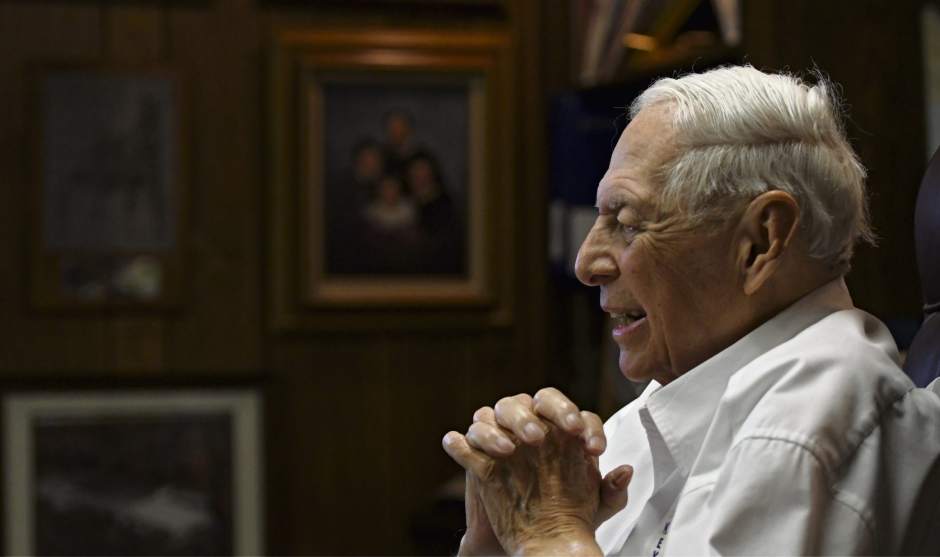There currently are 77 employees, and, while that number is down slightly from a few years ago because of automation, the company hasn’t had a layoff in 45 years, he said. Key Bellevilles is considered the largest manufacturer of bellevilles worldwide, Key said, with customers throughout the United States and in 56 other countries. The company doesn’t disclose revenue. Engineering, stamping, machining and heat treating are done at the plant off Route 356, said Key’s brother, Philip, 58, vice president of operations. With warehouse space added in 2013, the company can stock more than 35 million bellevilles, ready to be shipped out, and it keeps a large supply of steel used to make discs. “It’s amazing how much raw material inventory he keeps,” said Russ Buckbinder, a retired founding partner in Fastener Tool & Supply of Solon, Ohio. “Bob Key told me many times that was his thing — rather than having cash, he had the inventory, and it worked well for him.”
Fastener Tool & Supply buys million-piece quantities of bellevilles from Key’s company then sells them, 100,000 at a time, to a large valves and fittings manufacturer, Buckbinder said. Eloy Sedillo of Houston-based National Oilwell Varco, which sells oil and gas industry equipment, said he’s visited Key’s plant and doesn’t worry about products arriving on time. “When I place an order, it comes,” said Sedillo, who works in procurement at National Oilwell.
Key was a partner in a New Kensington law firm in 1967 when a cousin, George Key, who worked for Union Spring Corp. in that city, brought two of that company’s executives to see him. The men asked Key to find a company they could buy, then add bellevilles as a production line, because leaders at their company weren’t interested, he said. He arranged for them to buy the Ohio Springs Specialty division of Handy and Harman in Cleveland, and intended to buy a third of the business for $100,000. But his two prospective partners backed out, Key said, and he dipped into savings and stock earnings to come up with $300,000. Key and his cousin worked in Ohio for two years, setting up a belleville production line there. Key Bellevilles then moved to its current site, part of a 750-acre tract that industrialist Andrew Carnegie, and later Allegheny Ludlum Corp., once owned. Key had worked with a later purchaser of that property in 1965, and invested his fee and $15,000 to buy 100 wooded acres. He borrowed $100,000, and he and his father, Robert C. Key, a local home builder, built a plant in six weeks and opened it in 1969. Key said his company made regular springs for a while, and became a distributor for another brand before making and selling its own belleville products exclusively.
One important customer was found close to home. Key approached Alcoa Corp., then with thousands of workers in New Kensington, and was invited to talk with engineers at the company’s downtown Pittsburgh headquarters. Someone asked, “ ‘Can you make this for 91 cents?’ and I said ‘Yeah.’ That’s how we got our first order, and we’re still doing business with them,” Key said, “We got into Caterpillar. We got into Alcoa. We got into GE.
“I met a lot of people who wanted to give a young person a chance.” Bellevilles were supplied to a New Jersey company for work on NASA’s shuttle and have been used in other space technology, Key said. The discs are made “from the size of a dime to 3 feet in diameter and 3 inches thick” so that a million pounds of force would be needed to deflect it, he said. In addition to Philip Key, Key Bellevilles’ staff includes Robert Key’s brother Richard, a retired banker in Phoenix who is the chief financial officer; wife Patty, corporate secretary; daughter Kathy Brown and her son, Steve; granddaughter Jennifer Downard and her cousin Billy Key, who is George Key’s grandson. Key’s office sports harness racing murals. He raises standardbred horses, and said he has about 100 horses racing now, plus 50 broodmares.
